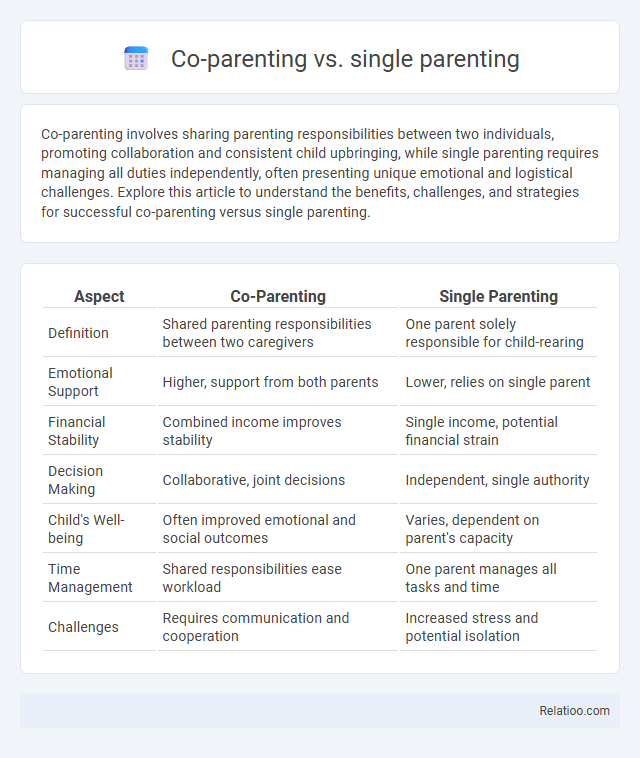Co-parenting involves sharing parenting responsibilities between two individuals, promoting collaboration and consistent child upbringing, while single parenting requires managing all duties independently, often presenting unique emotional and logistical challenges. Explore this article to understand the benefits, challenges, and strategies for successful co-parenting versus single parenting.
Table of Comparison
| Aspect | Co-Parenting | Single Parenting |
|---|---|---|
| Definition | Shared parenting responsibilities between two caregivers | One parent solely responsible for child-rearing |
| Emotional Support | Higher, support from both parents | Lower, relies on single parent |
| Financial Stability | Combined income improves stability | Single income, potential financial strain |
| Decision Making | Collaborative, joint decisions | Independent, single authority |
| Child's Well-being | Often improved emotional and social outcomes | Varies, dependent on parent's capacity |
| Time Management | Shared responsibilities ease workload | One parent manages all tasks and time |
| Challenges | Requires communication and cooperation | Increased stress and potential isolation |
Understanding Co-Parenting and Single Parenting
Understanding co-parenting involves shared responsibilities where two or more adults collaborate to raise a child, prioritizing the child's well-being while maintaining separate households. Single parenting requires managing all parental duties independently, demanding resilience and strong organizational skills to balance emotional, financial, and time commitments effectively. Your choice between co-parenting and single parenting impacts family dynamics, requiring careful consideration of communication, support networks, and the child's best interests.
Key Differences Between Co-Parenting and Single Parenting
Co-parenting involves two parents actively sharing responsibilities and decision-making for their child's well-being, fostering a collaborative environment that benefits the child's emotional and social development. Single parenting requires one individual to manage all caregiving, financial, and disciplinary tasks independently, often leading to increased stress but also greater autonomy in parenting choices. Your choice between these parenting styles significantly impacts family dynamics, resource allocation, and the support systems available to your child.
Advantages of Co-Parenting
Co-parenting offers the advantage of shared responsibilities, providing children with balanced emotional support and diverse role models from both parents. This approach typically results in improved child well-being, as consistent involvement from both parents fosters stability and reduces behavioral issues. Financial burdens are also alleviated through co-parenting, allowing for more resources to be directed toward the child's upbringing and education.
Challenges Faced in Single Parenting
Single parenting often involves managing financial pressures, time constraints, and emotional stress without the support of a partner, impacting both parental well-being and child development. You may encounter difficulties balancing work responsibilities with childcare, leading to limited personal time and increased fatigue. Unlike co-parenting or inclusive parenting, single parents frequently face social isolation and fewer resources for shared decision-making and emotional support.
Impact on Child's Emotional Well-being
Co-parenting fosters emotional stability by providing the child with consistent support from both parents, enhancing their sense of security and reducing anxiety. Single parenting may present challenges in emotional availability due to increased stress and limited resources, potentially impacting the child's emotional resilience. Inclusive parenting promotes emotional well-being by embracing diversity and open communication, helping your child develop empathy and a strong self-identity.
Communication and Decision-Making Styles
Co-parenting emphasizes collaborative communication and joint decision-making, ensuring both parents actively participate in the child's upbringing despite living separately. Single parenting often involves unilateral decision-making with direct, straightforward communication tailored solely by one caregiver, focusing on consistency and stability. Inclusive parenting integrates open dialogue and shared authority among all caregivers or family members, promoting diversity and collective responsibility in decisions affecting the child.
Financial Considerations in Both Parenting Styles
Co-parenting often allows for shared financial responsibilities, reducing individual burdens by splitting costs of childcare, education, and healthcare, whereas single parenting typically requires one person to manage all expenses, increasing financial strain. Inclusive parenting, which embraces extended family and community support, can also alleviate some costs through combined resources and shared caregiving duties. Your ability to budget effectively and seek financial assistance programs plays a crucial role in managing the economic challenges inherent in each parenting style.
Managing Conflicts and Setting Boundaries
Managing conflicts in co-parenting requires clear communication and mutual respect to prioritize the child's well-being, while single parenting demands strong personal boundaries to maintain stability and reduce stress. Inclusive parenting emphasizes collaboration among all caregivers, fostering open dialogue and shared decision-making to effectively resolve disagreements. Your ability to set consistent boundaries and navigate conflicts directly impacts the emotional health and development of the child.
Support Systems and Community Resources
Co-parenting benefits from shared responsibilities and access to dual support networks, enhancing emotional and practical assistance. Single parenting often relies heavily on external community resources such as local support groups, childcare services, and social programs to fill gaps in caregiving and emotional support. Inclusive parenting integrates diverse support systems, incorporating extended family, community organizations, and culturally relevant resources to foster a nurturing environment that respects varied family dynamics.
Choosing the Right Parenting Approach for Your Family
Choosing the right parenting approach for your family depends on factors like communication, flexibility, and the child's emotional needs. Co-parenting emphasizes shared responsibilities and consistent nurturing between separated parents, while single parenting requires a strong support network and effective time management. Inclusive parenting fosters diversity and acceptance, promoting open-mindedness and collaboration within all family structures.

Infographic: Co-Parenting vs Single Parenting
 relatioo.com
relatioo.com